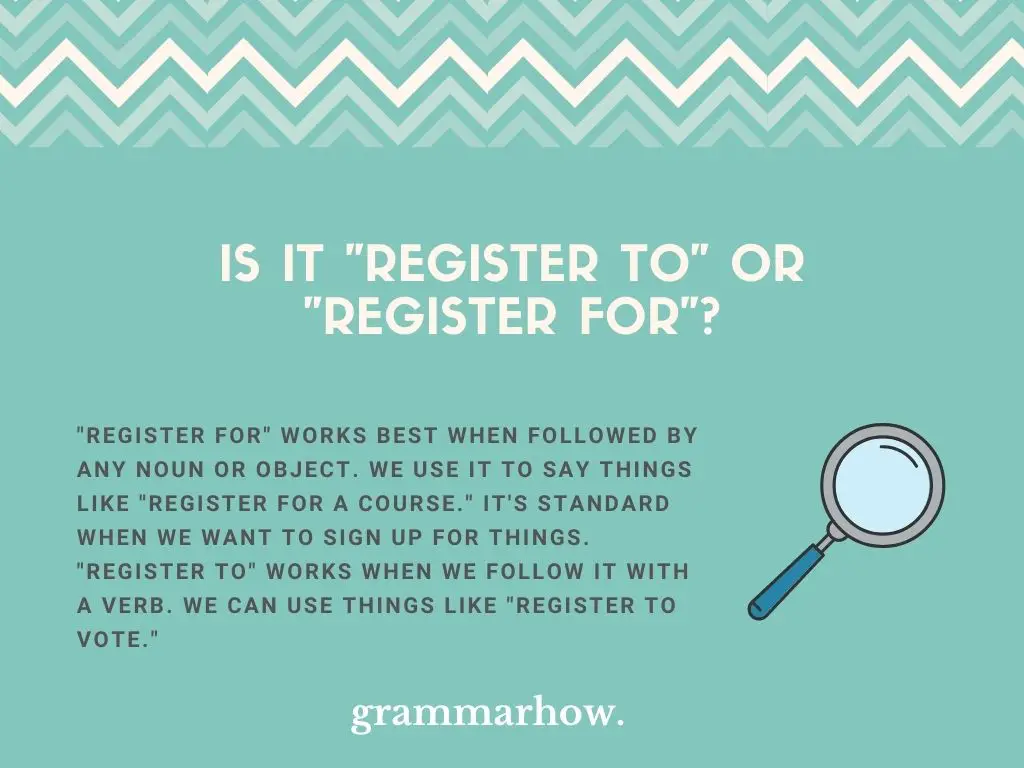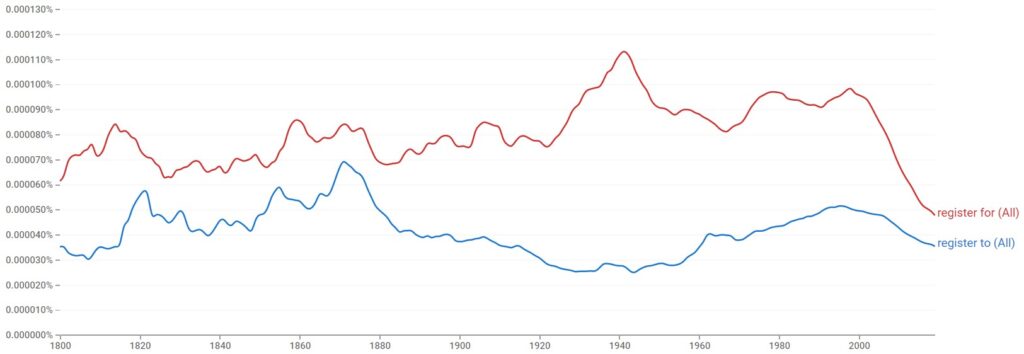“Register to” and “register for” are similar in usage, but the prepositional differences play a big part in their meaning. This article will explain all you need to know about how they work to make sure you don’t use them wrong in the future.
Is It “Register To” Or “Register For”?
“Register for” works best when followed by any noun or object. We use it to say things like “register for a course.” It’s standard when we want to sign up for things. “Register to” works when we follow it with a verb. We can use things like “register to vote.”

What Does “Register To” Mean?
“Register to” works when we use a verb after it. We can treat “to” as the start of an infinitive verb form. Infinitive verbs are things like “to vote,” “to eat,” and “to learn.” We always include “to” in these forms, which is why we use verbs with “register to.”
- I will register to vote later in the day. I don’t have the patience to fill out my details for it right now.
- Can you register to learn about it yet? I want to find out whether it’s worth my time.
- I will register to understand what’s going on. I need to know what’s happening out there before it’s too late.
- Let’s register to vote in the next election. It’s the only way we’re going to be able to make much of a difference.
- Have you registered to play yet? I don’t know why we need to do it, but it seems very important!
What Does “Register For” Mean?
“Register for” works best when talking about specific events, activities, or other nouns we might sign up for. Any noun can be used after “for,” and it’s a very good way to say that you’re looking to sign your name up for a specific event coming up in your calendar.
- I’m going to register for this college. I think it’s going to be my best chance to succeed in life.
- Will you register for the course with me? I’d love to do it with you because I know you’ll push me to do better.
- He has registered for the seminar. I’ll be checking to see whether he attends, but he would be foolish not to.
- Can you register for this course? I’m having a hard time doing it, and I wondered if there was something wrong with the site.
- Will you register for the event later, then? I notice your name isn’t down on the list yet.
Are “Register To” And “Register For” Interchangeable?
“Register to” and “register for” are not interchangeable. Their differences come down to whether a noun or verb form comes after them. Since nouns and verbs are completely different word structures, there is never a case when we can overlap the phrases.
Is “Register To” Or “Register For” Used The Most?
According to Google Ngram Viewer, “register for” is slightly more common. This is because we can use it in more situations since we’re more likely to refer to registering for specific events, activities, or courses.

Do You “Register To A Course” Or “Register For A Course”?
You will always “register for a course.” “A course” is the noun form we use in this sentence, and if you remember our explanations, we must always use “for” with a noun. This allows us to put our name down for a specific course we’d like to take.
- Correct: I’d like to register for a course, but I don’t know which one will work for me.
- Incorrect: I’m going to register to a course. Do you know which one will be best?
Do You “Register To An Event” Or “Register For An Event”?
The same rules apply here. We will always “register for an event” because “an event” is the noun phrase we use. It is not a verb, so using “register to an event” does not apply here. Make sure you only use “for” whenever this situation occurs.
- Correct: He will register for an event in the coming weeks. Keep an eye on which one he signs up for, though.
- Incorrect: Are you going to register to an event? I think it would be a good learning experience for you.
You may also like: “Register In” or “Register At” – Correct Preposition (+Examples)

Martin holds a Master’s degree in Finance and International Business. He has six years of experience in professional communication with clients, executives, and colleagues. Furthermore, he has teaching experience from Aarhus University. Martin has been featured as an expert in communication and teaching on Forbes and Shopify. Read more about Martin here.
